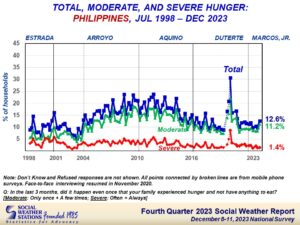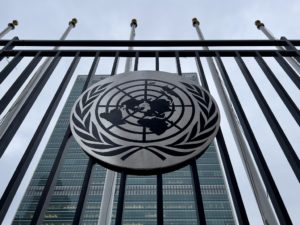MANILA, Philippines — The number of Filipino families who experienced “involuntary hunger” rose from 9.8 percent in September 2023 to to 12.6 percent in December 2023, based on the Social Weather Stations’ (SWS) latest survey results.
According to the SWS, “involuntary hunger” pertains to experiencing hunger and not having access to food at least once in the past three months.
“Compared to September 2023, hunger rose by 2.8 points from 9.8 percent,” said the SWS.
The latest number brought the annual hunger rate to 10.7 percent, which is slightly lower than the 11.7 percent average recorded in 2022, but still higher than the pre-pandemic average of 9.3 percent in 2019.
The SWS explained that the latest 12.6 percent involuntary hunger rate was the sum of 11.2 percent who experienced “moderate hunger, those who experienced hunger “only once” or “a few times” in the last three months; and 1.4 percent who experienced “severe hunger,” or those who experienced it “often” or “always” in the previous three months.
Both rates were higher than September 2023’s 8.4 percent and 1.3 percent, respectively.
Hunger rates up, except in Metro Manila
Based on the survey results, the involuntary hunger was highest in Balance Luzon at 14.3 percent, followed by Metro Manila at 12.7 percent, Mindanao at 12 percent, and the Visayas at 9.3 percent of families.
Mindanao saw the highest rise in involuntary hunger from 6.7 percent in September 2023 to 12 percent, followed by Balance Luzon from 10.3 to 14.3 percent and Visayas from 6.7 percent to 9.3 percent.
Meanwhile, only Metro Manila recorded a decrease from 17.3 to 12.7 percent.
Involuntary hunger also rose among self-rated poor Filipino families from 7.7 percent in December 2023 to 20.1 from 7.7 percent, while it decreased among non-poor Filipino families from 10.4 to 5.9 percent.
It also rose among the self-rated food-poor, from 7.0 percent to 25.5 percent, and likewise, a decrease among non-food-po from 11.0 percent to 6.5 percent.
SWS said the survey was conducted through face-to-face interviews with 1,200 adults — 300 each in Metro Manila, Balance Luzon, the Visayas, and Mindanao — with sampling error margins of ±2.8% for national percentages, and ±5.7% each for Metro Manila, Balance Luzon, the Visayas, and Mindanao.



